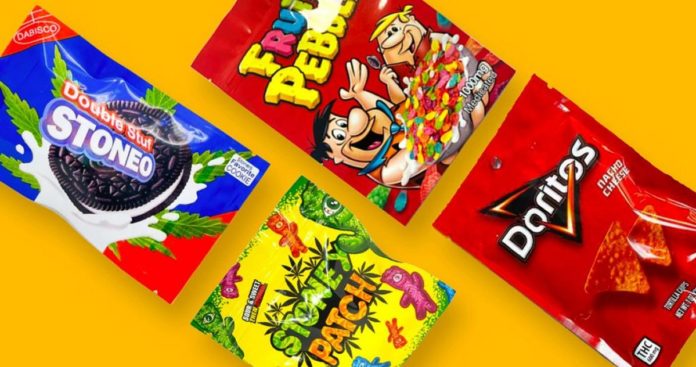A collective of US consumer packaged goods companies and associations is calling for an amendment to the SHOP SAFE Act to help fend off “copycat” cannabis edibles products containing THC.
Signatories to a letter including the Consumer Brands Association, General Mills and PepsiCo say the unscrupulous use of famous-brand logos, characters, trademarks and other branding on THC-laced edible products poses a threat to children.
THC – the cannabinoid that is responsible for the high produced by marijuana but is also a compound increasingly used medicinally, isn’t something that children should ingest in normal circumstances. And it appears these copycat products emulating popular snacks and candy are particularly problematic. A New York University study has revealed copycat products averaged 459 mg of THC, while most states have a legal limit of 100 mg on each packaged product.
The problem of children ingesting cannabis edibles isn’t insignificant. U.S. Poison Control Centers handled nearly 2,000 cases of young children ages 0 to 9 consuming edibles from 2017 to 2019. While it’s not clear how many of these incidents were related to copycat edibles, if a child is familiar with a legitimate snack company’s products and branding, then it is reasonable to assume such copycat products could be very attractive.
Cracking down on this practice appears to be a game of whack-a-mole. As infringing products are pulled from the market, others take their place. Consumer Brands says pursuing these individual violations is “notoriously difficult”.
To help combat the problem, the signatories propose a simple change to the SHOP SAFE Act, which targets the availability of harmful counterfeit products. It says the current language doesn’t prohibit sale of these products given the technical definition of counterfeit marks.
The tweak would be simple:
“This should be amended to include “famous” marks, a term already defined in U.S. code, to extend this protection and deter the sale of these,” says the open letter that can be viewed here.
While it’s certainly in “famous mark” companies’ interests to have the language tightened up, it’s also in the interests of the entire cannabis sector as this sort of unscrupulous activity doesn’t do it any favours.
The problem of copycat THC products also again brings into the spotlight issues relating to cannabis edibles generally – where products are packaged and presented in a way that could be attractive to children, and the apparent incapability of some parents to keep these products out of their reach.


